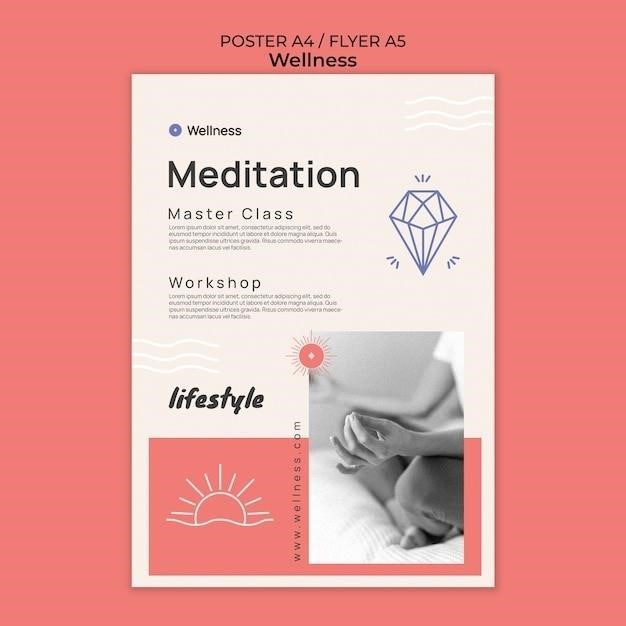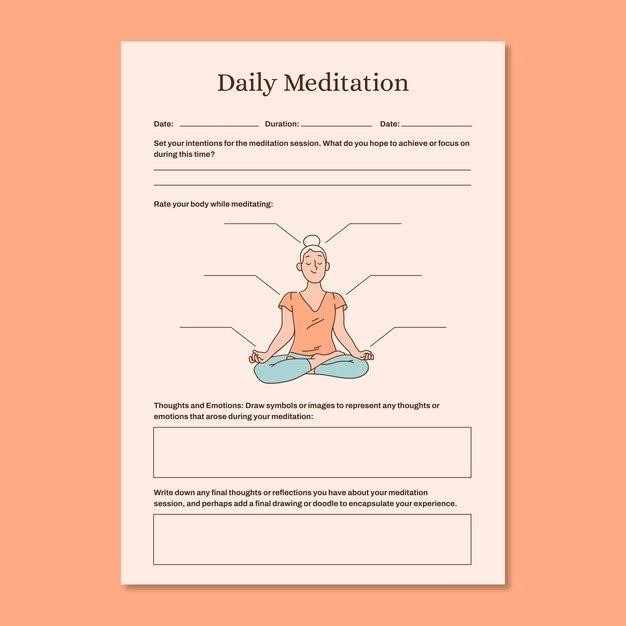Self-Love Meditation Script PDFs⁚ A Comprehensive Guide
This guide explores self-love meditation scripts in PDF format, offering various lengths, styles, and approaches to cultivate self-compassion․ Discover diverse scripts, from short, guided sessions to longer, unguided practices, enhancing your self-love journey․ Explore resources and further your understanding of self-love meditation․
Finding the Right Script
Selecting the perfect self-love meditation script PDF hinges on your experience level and preferences․ Beginners might find shorter, guided meditations more approachable, while experienced practitioners may prefer longer, unguided sessions for deeper exploration․ Consider the script’s tone – some are gentle and nurturing, while others are more direct and empowering․ Examine the language used; does it resonate with your personal style and beliefs? The availability of accompanying audio files can significantly enhance the experience, offering a soothing voice to guide your practice․ Explore different scripts until you find one that aligns with your needs and preferences, creating a personalized self-love meditation practice․
Types of Self-Love Meditations
Self-love meditation scripts encompass a wide spectrum of approaches․ Some focus on body scan meditations, guiding you to appreciate your physical form and release tension․ Others employ affirmations and mantras, repeating positive statements to instill self-worth and confidence․ Visualization techniques are frequently incorporated, inviting you to imagine yourself in ideal scenarios, fostering feelings of self-acceptance and love․ Compassion-focused meditations encourage self-kindness and understanding, acknowledging imperfections with empathy․ Certain scripts integrate elements of gratitude, prompting reflection on life’s blessings and fostering a sense of appreciation for oneself․ The choice depends on your personal preferences and the specific aspects of self-love you wish to cultivate․
Short vs․ Long Meditations
The duration of your self-love meditation is a personal choice, depending on your available time and energy levels․ Short meditations, typically lasting 5-10 minutes, are ideal for busy schedules or when you need a quick boost of self-compassion․ These concise practices offer a focused, impactful experience, perfect for incorporating into your daily routine․ Longer meditations, ranging from 15-30 minutes or more, allow for deeper exploration of self-love themes and provide ample time for relaxation and self-reflection․ Extended sessions may include more elaborate visualizations or guided journeys, facilitating profound shifts in perspective and fostering a stronger sense of self-acceptance․ Experiment with different lengths to determine what best suits your needs and preferences․
Guided vs․ Unguided Meditations
Guided meditations provide a structured framework, leading you through a journey of self-love with a narrator’s voice․ These scripts often incorporate visualizations, affirmations, and breathing techniques, offering a supportive and comforting experience, especially beneficial for beginners․ The clear instructions minimize mental effort, allowing you to fully immerse yourself in the practice․ In contrast, unguided meditations encourage self-discovery and exploration․ You set your own pace and focus, utilizing your intuition to guide the process․ These practices foster independence and cultivate a deeper understanding of your inner landscape․ While requiring more self-discipline, unguided meditations offer a unique opportunity to connect with your inner wisdom and develop a personalized self-love practice․ Choose the approach that resonates most with your current needs and experience level․

Creating Your Own Script
Crafting a personalized self-love meditation script empowers you to tailor the experience to your specific needs and preferences․ Experiment with affirmations, visualizations, and breathing techniques to create a unique and deeply resonant practice․
Present Tense Language
Employing the present tense in your self-love meditation script is crucial for creating an immersive and impactful experience․ Phrases like “I am worthy,” “I am loved,” and “I am enough” resonate more powerfully when stated in the present, creating a feeling of immediate self-acceptance․ The present tense fosters a sense of presence and immediacy, grounding the listener in the current moment and promoting a deeper connection with their inner self․ Avoid using future tense (“I will be loved”) or past tense (“I was loved”), as these tenses can create distance and diminish the immediate impact of the affirmations․ By consistently using the present tense, your script will effectively promote self-compassion and foster a sense of self-love in the present moment, encouraging the listener to embrace their current state of being with kindness and acceptance․ This approach encourages a more effective and meaningful meditation experience․
Affirmations and Mantras
Incorporating affirmations and mantras significantly enhances self-love meditation scripts․ Affirmations are positive statements that, when repeated, reprogram subconscious beliefs․ Examples include⁚ “I am worthy of love,” “I embrace my true self,” and “I am capable and strong․” Mantras, often from ancient traditions like Vedic chants (e․g;, “Aham Prema,” meaning “I am love”), offer powerful vibrational frequencies that promote inner peace and self-acceptance․ Select affirmations and mantras that resonate deeply with your personal beliefs and goals․ Repeat them slowly and with intention, allowing their meaning to sink into your subconscious mind․ The combination of affirmations and mantras creates a synergistic effect, amplifying the positive impact on self-perception and cultivating a profound sense of self-love․ Remember to choose phrases that feel authentic and empowering to you;
Incorporating Visualization
Visualization is a potent tool within self-love meditation scripts․ By creating vivid mental images, you engage your imagination to foster positive feelings and beliefs․ Imagine yourself surrounded by a warm, loving light, feeling safe and accepted․ Visualize a peaceful place—a beach, forest, or mountain—where you feel completely at ease․ Picture yourself interacting with loved ones, expressing your feelings openly and honestly․ Visualize past hurts transforming into lessons, releasing negativity and embracing self-forgiveness․ As you visualize, focus on the sensations associated with these images⁚ the warmth of the sun, the gentle breeze, the feeling of being loved and supported․ The more detailed and sensory your visualizations, the more powerful their impact on your subconscious, promoting self-compassion and self-acceptance․ Regular practice enhances the effectiveness of visualization in cultivating self-love․
Using Meditations Effectively
Maximize your self-love meditation practice by creating a calming environment, employing mindful breathing techniques, and consciously releasing negativity․ Regular practice enhances self-compassion․
Setting the Mood and Environment
To optimize your self-love meditation experience, carefully curate your environment․ Choose a quiet space, free from distractions, where you feel safe and comfortable․ Dim the lights to create a soothing ambiance; consider using candles or essential oil diffusers to enhance relaxation․ Soft, calming music can further deepen your meditative state, promoting a sense of peace and tranquility․ Ensure your posture is comfortable, whether seated or lying down, allowing your body to relax fully․ A cozy blanket or comfortable pillows can enhance physical comfort, minimizing any distractions that might interrupt your meditative flow․ Before beginning, take a few moments to simply breathe and settle into your space, allowing yourself to fully immerse in the present moment and prepare for your self-love meditation․
Breathing Techniques
Incorporate conscious breathing techniques to deepen your self-love meditation․ Begin by finding a comfortable position, then gently close your eyes․ Focus your attention on your breath, observing the natural rhythm of inhalation and exhalation․ Try a simple box breathing exercise⁚ inhale for a count of four, hold for four, exhale for four, and hold again for four․ Alternatively, practice a 3-part breath⁚ inhale deeply into your belly, then your chest, and finally your collarbone․ Exhale slowly and completely, releasing tension with each breath․ Experiment with different techniques to discover what resonates most with you․ As you breathe, visualize the breath as a conduit for self-love, drawing in positive energy with each inhale and releasing negativity with each exhale․ Maintain a gentle focus on your breath, allowing your mind to settle into a state of calm and presence․
Releasing Negativity
A crucial aspect of self-love meditation involves releasing negative thoughts and emotions․ During your practice, acknowledge any self-criticism, doubt, or negativity that arises without judgment․ Visualize these negative energies as clouds drifting away, or as leaves falling from a tree, gently carried away by the wind․ You might find it helpful to use affirmations such as “I release all negativity” or “I choose to embrace self-compassion” with each exhale․ Another technique involves mentally transforming negative thoughts into positive ones․ For example, if you think “I’m not good enough,” counter it with “I am worthy of love and acceptance․” This mental re-framing helps cultivate a more positive self-image․ Remember that this process takes time and patience; be kind to yourself as you navigate these emotions․ The goal is not to eliminate negativity entirely but to develop the ability to observe it without getting carried away․

Resources and Further Exploration
Explore Vedic mantras, guided meditation audios, and additional resources to deepen your self-love practice․ Regular practice yields significant benefits for well-being․
Vedic Mantras for Self-Love
Incorporate the power of Vedic mantras into your self-love meditation practice․ Mantras like “Aham Prema” (I am love) and “Om Hrim Ritam” (I embrace my true essence) resonate with profound feelings of self-acceptance and love․ These ancient Sanskrit chants carry potent vibrations that can dissolve self-doubt and cultivate inner peace․ Recite these mantras with heartfelt intention, allowing their energy to permeate your being․ Feel the transformative power of these sacred sounds as they gently melt away negativity and replace it with a deep sense of self-worth and unconditional self-love․ The rhythmic repetition of these mantras creates a meditative state, fostering a connection to your inner self and enhancing your capacity for self-compassion․ Regularly incorporating Vedic mantras into your meditation enhances the overall effectiveness of your practice, leading to a more profound and lasting sense of self-love and acceptance․ Remember to approach these mantras with reverence and sincerity, allowing their ancient wisdom to guide your journey toward self-discovery and inner harmony․
Additional Guided Meditation Resources
Beyond self-love meditation script PDFs, numerous resources offer guided meditations for self-compassion․ Explore online platforms and apps providing audio tracks and guided visualizations designed to cultivate self-love․ Many free and paid options cater to various experience levels, offering diverse approaches to self-acceptance; These resources often include detailed instructions and calming music, creating an immersive experience․ Some platforms offer meditations focusing on specific aspects of self-love, such as body positivity or self-forgiveness, providing targeted support for personal growth․ Consider exploring different styles to find what best suits your preferences․ Whether you prefer a gentle, soothing voice or a more energetic, uplifting tone, a wide array of options are available to complement your self-love journey․ Remember to choose resources aligned with your comfort level and personal preferences for optimal results․ Supplementing your self-love meditation practice with these additional resources can further enhance your self-compassion and overall well-being․
Benefits of Regular Practice
Consistent self-love meditation, utilizing PDFs or audio guides, offers numerous benefits for mental and emotional well-being․ Regular practice cultivates self-compassion, fostering a kinder inner dialogue and reducing self-criticism․ Studies show meditation reduces stress and anxiety, promoting relaxation and emotional regulation․ By focusing on self-acceptance, these practices enhance self-esteem and confidence, leading to improved self-image and overall life satisfaction․ The ability to manage negative emotions increases, leading to greater resilience and emotional stability․ Regular meditation improves mindfulness, allowing you to be more present and aware of your thoughts and feelings without judgment․ This increased self-awareness facilitates personal growth and healthier coping mechanisms․ Improved sleep quality is another common benefit, as meditation promotes relaxation and reduces racing thoughts before bed․ Ultimately, consistent self-love meditation enhances self-awareness, emotional regulation, and overall well-being, fostering a more positive and fulfilling life․
